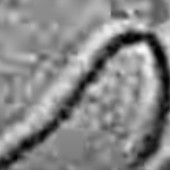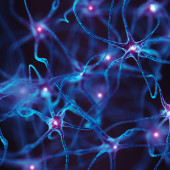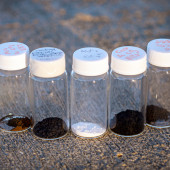Latest Releases
Find our latest releases below. After searching, you can view the most recent releases by clearing the search.
Browse experts on:

Watch a live catalytic event in real time
April 11, 2025
A Northwestern University-led international team of scientists has, for the first time, directly observed catalysis in-action at the atomic level.

New key genes in Parkinson’s disease identified using CRISPR technology
April 10, 2025
A longstanding mystery in Parkinson’s disease research has been why some individuals carrying pathogenic variants that increase their risk of PD go on to develop the disease, while others who also carry such variants do not.

Your skin is breathing. This new wearable device can measure it.
April 9, 2025
Northwestern University researchers have developed the first wearable device for measuring gases emitted from and absorbed by the skin.

ALS drug effectively treats Alzheimer’s disease in new animal study
April 8, 2025
Experimental drug NU-9 — a small molecule compound approved by the U.S. Food and Drug Administration (FDA) for clinical trials for the treatment of amyotrophic lateral sclerosis (ALS) — improves neuron health in animal models of Alzheimer’s disease, according to a new Northwestern University study.

A daring new ‘Man of La Mancha’ kicks off spring at the Wirtz Center
April 7, 2025
A timely retelling of a classic musical kicks off the Wirtz Center’s spring season at Northwestern. Goodman Theatre resident director Henry Godinez reimagines “Man of La Mancha” –– arguably one of the world’s most popular musicals.

Kyle Stephan appointed as Steven and Lisa Munster Tananbaum Curator of Modern and Contemporary Art at The Block Museum of Art
April 7, 2025
Kyle Stephan has been appointed Steven and Lisa Munster Tananbaum Curator of Modern and Contemporary Art at The Block Museum of Art at Northwestern University. She will begin her tenure in August 2025

'Medicaid work requirements create red tape and waste millions,' expert says
April 4, 2025
Northwestern University health economist and policy researcher Lindsay Allen is available to speak to media about ongoing discussions in Congress related to Medicaid work requirements
* Media Advisory
* Media Advisory
Research suggests attacks on higher ed part of a ‘political playbook’ since the Civil Rights Movement
April 4, 2025
EVANSTON, Ill. --- History has repeatedly shown that moments of major social and political progress are often followed by backlash. For example, following the signing of the Emancipation Proclamation in 1863, the Reconstruction Era saw unchecked violence against Black Americans, and after the women’s suffrage movement secured the rights of women to vote, anti-suffrage propaganda dominated the conversation for much of the early 20th century.
* Media Advisory
* Media Advisory

Carbon capture could become practical with these scalable, affordable materials
April 3, 2025
Researchers at Northwestern University have expanded the potential of carbon capture technology that plucks CO2 directly from the air by demonstrating that there are multiple suitable and abundant materials that can facilitate direct air capture.

Corpse flowers are threatened by spotty recordkeeping
April 3, 2025
In a new study, scientists constructed the ancestry of corpse flowers living in collections at institutions and gardens around the world. They found a severe lack of consistent, standardized data. Without complete historical records, conservationists were unable to make informed decisions about breeding. Of the corpse flowers studied, therefore, 24% were clones and 27% were offspring from two closely related individuals.